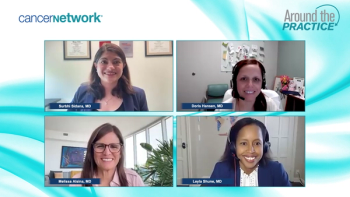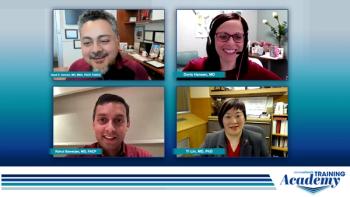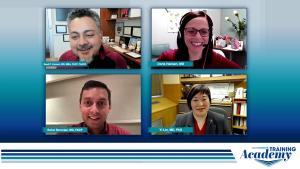Articles by Doris Hansen, MD

Panelists discuss the growing importance of early integration and collaboration between community oncologists and specialized centers in the evolving chimeric antigen receptor (CAR) T-cell therapy landscape for multiple myeloma, emphasizing timely referrals, coordinated care, and strategic sequencing with other immunotherapies to optimize patient outcomes.

Panelists discuss the essential role of supportive care following chimeric antigen receptor (CAR) T-cell therapy in multiple myeloma, emphasizing infection prevention through prophylaxis, immunoglobulin replacement, and vaccination strategies, along with the importance of coordinated long-term management between CAR T centers and community oncologists to ensure sustained survivorship care.

Panelists discuss the need for consolidation and maintenance strategies following chimeric antigen receptor (CAR) T-cell therapy in patients with high-risk multiple myeloma, highlighting emerging real-world and clinical evidence supporting the use of agents like lenalidomide and bispecific antibodies to extend disease control and improve outcomes in those with historically shorter remissions.

Panelists discuss real-world evidence showing that chimeric antigen receptor (CAR) T-cell therapy is safe and effective in traditionally excluded populations with multiple myeloma, including those with comorbidities or central nervous system (CNS) involvement, emphasizing the role of multidisciplinary care, proactive toxicity management, and growing confidence in extending access to high-risk patients.

Panelists discuss emerging strategies to manage delayed neurotoxicity from chimeric antigen receptor (CAR) T-cell therapy in multiple myeloma, highlighting the predictive value of postinfusion lymphocyte expansion, the potential of early dexamethasone intervention, and the need for continued research and collaboration to refine toxicity prevention and ensure safer, broader use of CAR T in earlier treatment lines.

Panelists discuss the growing support for incorporating chimeric antigen receptor (CAR) T-cell therapy earlier in the multiple myeloma treatment pathway, emphasizing the importance of timely referral and personalized decision-making to maximize patient outcomes before disease progression or comorbidities limit eligibility.

Panelists discuss the critical role of sequencing B-cell maturation antigen (BCMA)-targeted therapies in multiple myeloma, emphasizing that administering chimeric antigen receptor (CAR) T-cell therapy before bispecific antibodies leads to better outcomes, while real-world evidence and emerging guidelines increasingly inform strategic decisions based on treatment timing, disease urgency, and patient-specific factors.

Panelists discuss the emerging real-world use of talquetamab as a bridging therapy before chimeric antigen receptor (CAR) T-cell treatment in patients with advanced multiple myeloma, highlighting its ability to rapidly reduce tumor burden and improve CAR T outcomes despite unique toxicities and emphasizing how clinician-driven innovation is shaping practice ahead of clinical trial data.

Panelists discuss the real-world comparison of ciltacabtagene autoleucel (cilta-cel) and idecabtagene vicleucel (ide-cel) chimeric antigen receptor (CAR) T-cell therapies for multiple myeloma, highlighting cilta-cel’s superior efficacy but higher toxicity and emphasizing the importance of tailoring treatment decisions to individual patient factors such as disease stage, health status, and personal preferences.

Panelists discuss the transformative impact of chimeric antigen receptor (CAR) T-cell therapy on treating relapsed/refractory multiple myeloma (R/R MM) in real-world settings, emphasizing improved patient outcomes, the expanding role of real-world evidence, and the nuanced decision-making required in selecting among newly approved, highly effective immunotherapies.

Future Perspectives on CAR T-Cell Therapy in Relapsed/Refractory MM
BySaad Z. Usmani, MD, MBA, FACP,Rahul Banerjee, MD, FACP,Doris Hansen, MD,Yi Lin, MD, PhD The panel concludes its discussion with key takeaways on the evolving role of CAR T-cell therapy in the treatment of patients with relapsed/refractory multiple myeloma.

Insights from CARTITUDE-4 and KarMMa-3 in R/R MM
BySaad Z. Usmani, MD, MBA, FACP,Rahul Banerjee, MD, FACP,Doris Hansen, MD,Yi Lin, MD, PhD Experts on multiple myeloma provide their impressions of the CARTITUDE-4 and KarMMa-3 studies, which led to the approval of cilta-cel and ide-cel in earlier lines of treatment for patients with relapsed/refractory disease.

CAR T-Cell Therapy in R/R MM: Treatment Selection, Safety, and Future Perspectives
BySaad Z. Usmani, MD, MBA, FACP,Rahul Banerjee, MD, FACP,Doris Hansen, MD,Yi Lin, MD, PhD Myeloma specialists have a comprehensive discussion on CAR T-cell therapy, highlighting treatment selection considerations, adverse event management strategies, unmet needs, and ongoing research.

Key Takeaways from the CARTITUDE-1 and KarMMa Studies
BySaad Z. Usmani, MD, MBA, FACP,Rahul Banerjee, MD, FACP,Doris Hansen, MD,Yi Lin, MD, PhD Focusing on later lines of therapy for patients with relapsed/refractory multiple myeloma, the panel provides key takeaways on the CARTITUDE-1 and KarMMa trials that investigated cilta-cel and ide-cel.

How CAR T-Cell Therapy Impacts Relapsed/Refractory MM Treatment
BySaad Z. Usmani, MD, MBA, FACP,Rahul Banerjee, MD, FACP,Doris Hansen, MD,Yi Lin, MD, PhD Yi Lin, MD, PhD, provides insights on the impact of CAR T-cell therapy on the evolving multiple myeloma treatment landscape.

The Impact of CAR T-Cell Therapy on Relapsed/Refractory MM Treatment
BySaad Z. Usmani, MD, MBA, FACP,Rahul Banerjee, MD, FACP,Doris Hansen, MD,Yi Lin, MD, PhD Rahul Banerjee, MD, FACP, discusses how the emergence of CAR T-cell therapy has impacted the multiple myeloma treatment landscape by addressing unmet needs and improving patients’ quality of life.

The Rationale for CAR T-Cell Therapy in Relapsed/Refractory Multiple Myeloma
BySaad Z. Usmani, MD, MBA, FACP,Rahul Banerjee, MD, FACP,Doris Hansen, MD,Yi Lin, MD, PhD A panel of experts on multiple myeloma discuss the rationale for CAR T-cell therapy, highlighting BCMA as a target and treatment administration practices.




